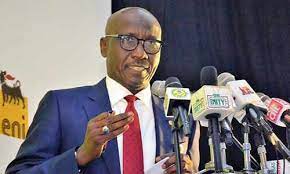Business
NNPC Denies Funding 2019 Elections With Oil Traders’ Bribes

The Nigerian National Petroleum Corporation (NNPC) has reacted to an allegation that fees that trading firms paid agents to win oil contracts from the corporation might have raised funds for the country’s past two elections.
Nigeria’s past two general elections held in 2015 and 2019.
The contest for the presidential seat was mainly between ex-President Goodluck Jonathan and President Muhammadu Buhari in 2015, while it was between Buhari and former Vice-President Atiku Abubakar in 2019.
Buhari was declared winner in the two elections.
Citing lawsuits in London and New York, Bloomberg had reported last Friday that an ex-BP Plc oil trader alleged that cargo allocations by the NNPC could have contributed to preparations for general elections in 2019.
The report said a former Glencore Plc employee in July admitted paying a middleman $300,000 to secure a crude shipment from the NNPC, understanding the money would be spent on the nationwide election that took place four years earlier.
The NNPC, through its Direct Sale of Crude Oil and Direct Purchase of Petroleum Product scheme, awards contracts that allow companies, including international trading houses and indigenous firms, to lift crude oil in return for the delivery and supply of petroleum products. The contracts are usually for one year.
The Group General Manager, Group Public Affairs Division, NNPC, Mr Garba-Deen Muhammad, has, however, refuted the allegation.
“[It’s] not true, and I think that is obvious if you read the story with an open mind,” he said via a text message to a national daily.
Jonathan Zarembok, who left BP’s West Africa desk last year, was quoted as saying in the suit that he suspected that fees paid by the United Kingdom energy giant to obtain NNPC contracts would go toward the 2019 elections.
He filed an employment claim against BP, alleging that he was fired for raising concerns about the large sums being transferred to intermediaries to win business in Nigeria.
Zarembok was quoted as saying in a witness statement made public this month that emails sent in 2017 by a BP executive in Nigeria were a “clear red flag” and implied “there would be pressure to pay bribes”.
According to Bloomberg, the emails discussed how preparations for elections would get underway in 2018.
“We understand what that means,” the executive wrote.
He said the company then wired $900,000 in fees to a local agent after securing two oil cargoes from NNPC.
“BP is defending in full and denies all allegations made by the claimant,” Bloomberg quoted the company as saying in a statement.
It said BP declined further comment while Zarembok’s case at a London employment tribunal continues.
The report noted that similar details emerged two months ago, when Anthony Stimler, who left Glencore in 2019, pleaded guilty to corruption and money-laundering charges.
It said Stimler was notified in September 2014 that “Foreign Official 1” was asking all NNPC clients to pay an advance on each cargo “in connection with a then-upcoming political election,” according to US court filings.
He then had Glencore wire $300,000 to an intermediary company, which prosecutors said was used “to pay bribes to Nigerian officials.”
US prosecutors outlined how Stimler and others paid bribes worth millions of dollars in several countries, including to NNPC officials, between 2007 and 2018, according to the report.
Business
Two Federal Agencies Enter Pack On Expansion, Sustainable Electricity In Niger Delta

Business
Why The AI Boom May Extend The Reign Of Natural Gas

Business
Ogun To Join Oil-Producing States ……..As NNPCL Kicks Off Commercial Oil Production At Eba

-

 Sports2 days ago
Sports2 days ago2026 WC: Nigeria, DR Congo Awaits FIFA Verdict Today
-

 Featured5 days ago
Featured5 days agoINEC Proposes N873.78bn For 2027 Elections, N171bn For 2026 Operations
-

 News5 days ago
News5 days agoFubara Tasks Nigeria’s Surveyor-General On C of O …Says Surveyors’ Role Pivotal In Governance
-

 Environment2 days ago
Environment2 days agoOxfam, partners celebrate 5 years of climate governance programmes in Nigeria
-

 Featured5 days ago
Featured5 days agoFubara Dissolves Rivers Executive Council
-
Politics2 days ago
ADC, PDP, LP Missing As INEC Set For By- Elections In Rivers
-
Politics2 days ago
FG’s Economic Policies Not Working – APC Chieftain
-

 Politics2 days ago
Politics2 days ago2027: Diri Unveils RHA LG Coordinators, APC Congress Panel

